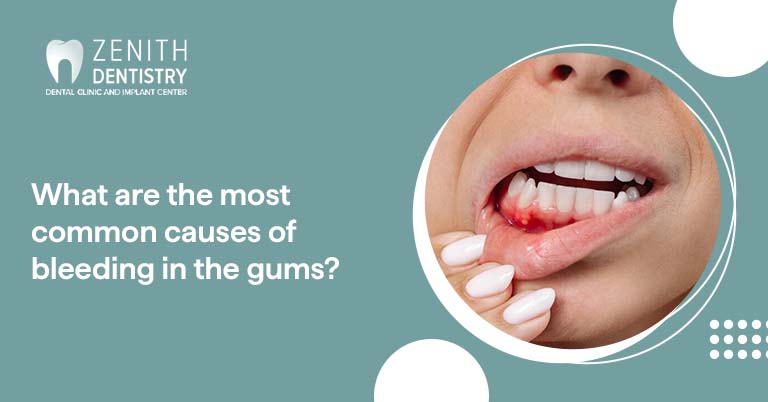
What are the most common causes of bleeding in the gums?
Have you noticed your gums bleeding unexpectedly? Does this happen when you floss or brush your teeth? While a little blood after brushing, flossing, or even biting into food can be normal, continuous gum bleeding is not. Frequent gum bleeding may indicate gum disease, one of the most common culprits for this issue.
Gum disease remains a silent menace, silently causing your gums to bleed, swell, and become infected or simply irritate. Gingivitis marks its initial stage, and without intervention, it can progress to periodontitis, a severe infection capable of inflicting lasting harm on your oral health.
What causes bleeding gums?
Although gum disease stands as a primary factor behind bleeding gums, additional underlying factors can incite gum pain and bleeding:
Infection
Infection is the most common and main cause of bleeding gums. Soft plaque consists of 70% microorganisms. Microorganisms in dental plaque settle with a certain pattern. This means that with poor or insufficient hygiene, the strains of microorganisms in the already-formed dental plaque change within a certain number of days, increasing to the most aggressive ones.
Diabetes
The presence of diabetes significantly elevates the risk of gum disease development. The reason lies in the potential for high blood sugar to harm blood vessels, ultimately reducing blood flow and the supply of vital nutrients to the gums and bones, thereby heightening susceptibility to infections like gum disease.
Hemophilia
Hemophilia, a rare blood disorder affecting blood clotting, often results in bleeding gums for those affected. Regular dental check-ups are imperative for managing this condition.
Vitamin Deficiency
Insufficient intake of essential vitamins can lead to gum problems. When there’s a deficiency in Vitamin C, commonly referred to as scurvy, it results in gum inflammation. Neglecting this issue may eventually lead to tooth loss. Moreover, a shortage of Vitamin K can also trigger significant dental issues. Vitamin K plays a crucial role in the blood clotting process, and a diet lacking it often manifests through bleeding gums.
Anticoagulant medications
If you take blood-thinning medications like aspirin, you are at risk of bleeding gums. Your dentist can offer you home treatments such as antiseptic mouthwashes to prevent this bleeding.
Pregnancy
Hormonal changes in pregnant women can cause incidental bleeding of the gums. This problem is quite common and normally goes away later in pregnancy or after birth. Pregnancy hormones make your gums more sensitive to bacteria found in plaque, which promotes inflammation in your gums.
Poorly fitted dentures
If you wear dentures and frequently suffer from bleeding gums, you should contact your dentist. Bleeding can be caused by a denture that is too tight. Your dentist may decide to rebase it to make it fit better.
Flossing or brushing too hard
Your flossing or brushing technique may be one of the reasons for tooth bleeding. If your toothbrush is too hard or you floss too vigorously, you can cause bleeding.
Treatment of bleeding gums
If you are concerned about bleeding gums, see your dentist for the best treatment for you.
You should also visit your dentist regularly to avoid pain or bleeding from your gums by limiting the formation of plaque and tartar. Dental hygiene specialists recommend scaling at least twice a year.
Flossing and brushing your teeth properly can also prevent bleeding gums. Switching to an electric toothbrush allows you to clean your teeth thoroughly without being too harsh on the gums. Otherwise, choose a softer, less aggressive toothbrush for your sensitive or swollen gums.
Your dentist may also recommend the use of an antibacterial mouthwash, which helps reduce plaque, or a simple home treatment using warm salt water, a preparation that can relieve swollen gums.
Prevention of bleeding gums
Given that gingivitis stands as the root cause of gum bleeding, bolstering your dental regimen can serve as an impeccable shield against this discomfort. Here are some fundamental recommendations to consider.
Daily Dental Maintenance for Bleeding Gums Prevention
The optimal approach to thwart bleeding gums entails brushing your teeth consistently, ideally two to three times a day, with a soft-bristled toothbrush and toothpaste enriched with fluoride. Ensure a thorough cleaning of the gum line, tongue, and all potential bacterial and food debris hiding spots within your mouth. Regularly replacing your toothbrush is another wise practice to preserve its efficacy and avert painful afflictions such as cavities and gingivitis.
Spit out excess toothpaste after brushing your teeth, but do not rinse your mouth with water immediately. By giving toothpaste residue time to soak in, you ensure that the fluoride stays longer and provides better protection.
Use Dental Floss between Teeth
Flossing is another crucial part of maintaining a healthy mouth. A regular toothbrush cannot get between the teeth, so you must use another tool to clean these areas. Otherwise, pockets of plaque could form and lead to inflammation of the gums.
Keep in mind that it’s normal to have sore or even slightly bleeding gums when you first start flossing. After a week or so, your gums will naturally strengthen, and the slight discomfort should disappear.
Use an Antiseptic Mouthwash
Adding mouthwash to your daily routine is always worth it because it cleans a larger area of your mouth and helps prevent swelling of the gums caused by bacterial infection.
In addition to discouraging inflammation, it can also help freshen your breath by killing bacteria associated with halitosis (bad breath). We recommend a mouthwash containing fluoride to better protect your teeth and gums throughout the day.
Adopt a Health-Conscious Diet and Lifestyle
Taking on a diet that balances not only shields you from gum bleeding and the development of plaque but also actively enhances your overall health. Eschew highly processed and sugary products, and instead, aim to incorporate foods teeming with vitamin C and vitamin K to fortify your immune system.
It’s vital to note that lifestyle choices, particularly alcohol consumption and smoking, can exacerbate gum bleeding. When in a state of poor health, any ongoing gum infections may experience extended healing times, potentially progressing to gingivitis.
Frequent Dental Check-Ups are Essential
When it concerns the health of your teeth and gums, there is no viable alternative to regular visits to the dentist. Just as you take your vehicle to the mechanic for routine maintenance, dentist appointments are paramount for preserving your dental health.
During these check-ups, your dentist will carefully evaluate your oral condition, pinpoint any concerns, and provide the requisite treatment. Moreover, professional cleanings surpass your everyday tooth-brushing regimen by a significant margin. Dentists leverage specialized tools to thoroughly eliminate plaque buildup from every crevice of your mouth.
In the event of frequent gum bleeding, it is advised not to delay until your upcoming appointment. Schedule an appointment promptly and pursue treatment to avert any deterioration in your condition. Fortunately, bleeding gums, gingivitis, and various manifestations of periodontal diseases are amenable to treatment, even during advanced stages. Swift consultation with your dentist can impede the advancement of gum disease, ensuring the longevity of your radiant, robust smile. Whether you seek counsel, diagnosis, or therapeutic intervention, do arrange an appointment today to evade future instances of gum bleeding!






